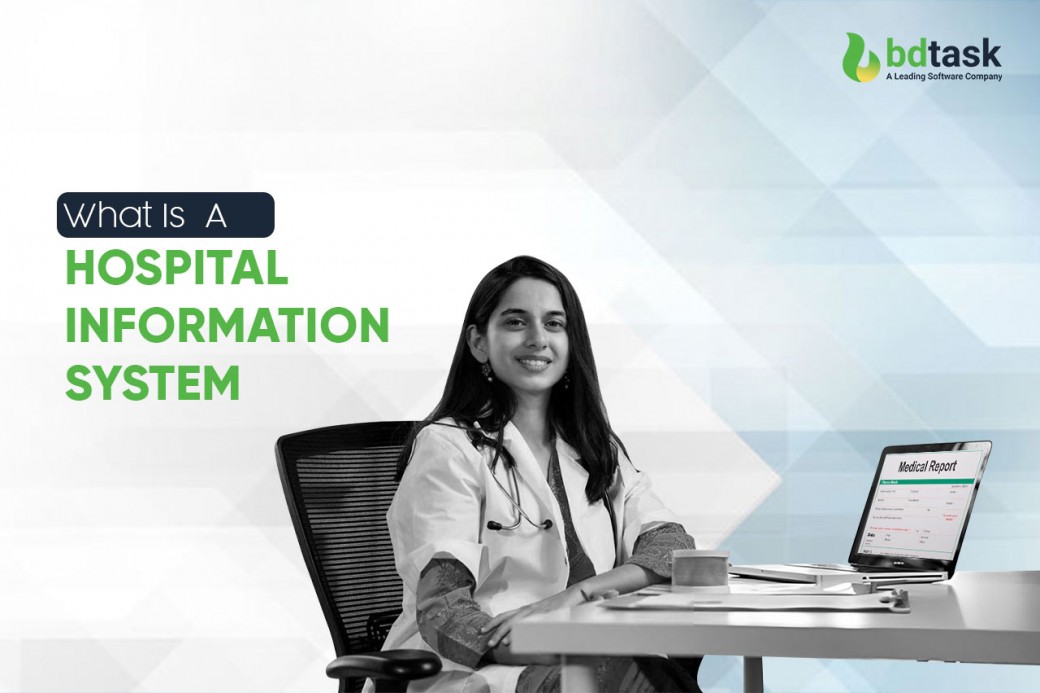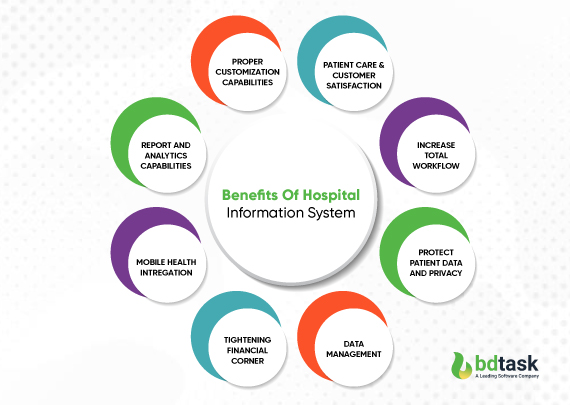What Is A Hospital Information System

The healthcare industry heavily relies on hospital information systems. But what is a hospital information system? It acts as the backbone of hospital management.
It's not just an information system. It helps to collect, store, manage and transmit a patient's electronic medical record (EMR). An automation system can help to increase the overall hospital operations, particularly patient information, and ensure proper healthcare delivery.
With no doubt, the hospital information system market size is growing. Its overall growth rate is 6.4 billion, expected to reach 91.6 billion in 2030.
Continue reading to learn what is a hospital information system is and all its benefits.
So, let's start healthy.
What Is A Hospital Information System
Obviously, hospital information is part of the hospital management system. On the other hand, it's an important automation tool that can streamline various hospital workflows. This includes maintaining patient care records and the hospital's administrative and financial management. Indeed, the basic components of an HIS are:
- X-ray management
- Testing management
- Pathology management
- Cytology management
- Surgery management
- Departments System
- Patient management
- Payment method
- Pharmacy management
- Functional rehabilitation
- Blood filtration system
- Blood storage system
- Nutrition system
A hospital information system acts like a centralised database where all of the data is stored, secure and well-organised. Let's see how the hospital information system works in any hospital or clinic organisation.
How Hospital Information System Works
Suppose a patient is coming into the hospital for treatment. So they need to fill in some of the information like their names, patient status, address, financial statements & more. In the old times, patient information was noted down on paper. Patient data is manually written on paper, and sometimes, if the data is wrong, then it will be a hassle for both sides. But in this digital age, all things are done by automated software which helps reduce errors and increase the efficiency of the working process.
The HIS helps to automate all the administrative work for clinics and hospitals. It includes day-to-day work like maintain appointment, billing, insurance and all other staff.
Here are the steps that must be followed to maintain clinic information.
- Patient data collection and storage in a system
- Integrated with different departments (labs, radiology, pharmacy &more )
- Record management (medical history, treatment plan)
- Automated workflow in different departments
- 24/7 data analytics and updates through recommendations
- Give patients access to update or edit their information
- In the end, it will ensure the proper security of the information
Other hospital administrative work is also done using hospital information software. Overall, it will help improve the hospital workflow and increase the clinic's and hospital's productivity. It boosted the revenue scale at the end of the year and maintained solid customer satisfaction.
Different Types of Hospital Information Systems
HIS comprises various components, each of which plays a different role in effectively maintaining this system. Let's check them out below to get a better overview of each type.
Electronic Medical Record (EMRs) & EHRs
It's an automated version of patients' paper files and documents. EMR basically work for patients' medical documents' safety and accurate medical records. It also includes medical stories, diagnoses and other treatments. On the other hand, EHRs can also provide more detailed records of each patient's history and other patients' related data. One of the advantages is that you can share its data with another platform so that the work is done more smoothly. It offers several benefits, including:
- Smooth data transfer
- Data storage and management
- Reduce the redundancy
- High level of workflow
Patient Information Management Software
It also helps to improve the overall patient management system. It includes scheduling appointments, medical billings, and managing insurance claims. It classifies administrative tasks, increases patient flow, and improves operational efficiency. It also has a patient portal so patients can easily access their appointment status, lab reports and medications.
Practice Information Management System
Scheduling, billing and daily operations are all details that are easily manageable with this system. This practice management system is an essential type of hospital information system that automates the daily work of administration. A key feature of practice information system
- Online Scheduling
- Automated Reminders
- Payments
- Appointment Profiles
- Real-Time Eligibility Checks
Laboratory Information Management System
With the help of a medical information system, laboratory work is done more smoothly than ever. You can easily monitor and check all the lab results and other tests with it. This system also reduces the error rate of lab test reports. No worries about missing any lab report or medical test report. Hospital information systems ensure the accurate and timely delivery of test requests and streamline work.
Radiology Information Systems (RIS)
Without a doubt, dedication and lots of time are needed to achieve a successful radiology practice. It's also capable of managing a radiology information system. It includes image storage, retrieval, and management. It's also used to track radiology imaging orders and type billing information. It also brings some of the best benefits for your hospital or clinic radiology department, including:
- More Accurate Diagnoses
- Better material hospital management
- Better patient coordination
- More or less better patient care and satisfaction.
Pharmacy Information System
This pharmacy information system quickly does all the pharmacy-related operations. PIS in basically three components include
- Pharmacy management
- Inventory management
- Dispensing management
Indeed, it also records, oversees, and stores patient-related information. With this pharmacy information system, doctors can easily manage prescriptions and check which medicine is available in the inventory and which is not. You can also check the price for various drugs in stock.
Clinical Decision Support System
It helps to improve the patients and healthcare delivery system. It can also handle large volumes of patient data and organise it easily. Include the process of this data and categorise them. After categorising the data, it then automates the suggestion of the next possible course of action for patients' treatment.
Two types of CDSS in this system include
- Knowledge-Based CDSS
- Non-Knowledge-Based CDSS
It's used for patient safety and to control the cost of this segment of medical facilities. Apart from that, there are some other components of the hospital information system, such as billing, finances, and scheduling. This also helps to optimise the workflow and increase the efficiency of medical facilities. So, after learning what is a hospital information system, it is time to get knowledge about the benefits of this system.
Benefits of Hospital Information System in Hospital

If we talk about the hospital information system benefits, then it's huge, and it has directly impacted the hospital's growth & revenue.
Patient Care & Customer Satisfaction
Patient care and customer satisfaction are the most important parts of any hospital. If the hospital does not provide the maximum and satisfactory patient care output, they lose their patients. If the patients had a bad experience in your hospital care, then it's sure that they dont come back here again. So, if you have a hospital management information system, then it will give a total centralised view of patients' history. On the other hand, it will help to reduce the risk of errors. As a result, it provides smoother communication among doctors, nurses, and specialists.
Maximum and personalised care that leads to ultimate patient care and customer satisfaction. It also increases the hospital's brand value.
Increase Total Workflow
Hospital information management ensures that the proper workflow of the hospital facilities is maintained. When all the tasks are done automatically, it can save time for staff. For that, medical staff or managers can find more time to do other important stuff. Healthcare management information systems lead to an efficient hospital environment.
HIS optimises resource allocation to ensure that doctors, nurses, and other equipment are used effectively. This led to :
- Better efficiency
- Better decision-making for all
- Reduce error
- Improve complete working environment
Protect Patient Data and Privacy
Cyber attacks are quite common in this age. Undoubtedly, patient data is one of the top concerns for the hospital industry. Hospital information systems maintain proper rules so that unauthorised people do not access those personal patient files. Only authorised people can access their files and edit that information if they want to. This software helps to prevent data breaches. Patient confidentiality and maintaining trust between patients and healthcare providers.
Data Management
Hospitals generate a massive amount of data daily. Sometimes, data management will be a burden for hospital staff. For that, an HIS is the solution. HIS not only stores this data securely but also turns it into actionable insights.
HIS provides real-time dashboards and custom reports that help monitor performance metrics, occupancy rates, and treatment outcomes. Many hospital management information systems have built-in tools to help comply with healthcare regulations and standards, such as HIPAA or local health authority requirements. Historical data from HIS can be used for medical research, disease tracking, and future resource planning. Proper data handling leads to transparency, accountability, and strategic decision-making at all levels of hospital data management.
Cost Control
There are some upfront costs in health IT. Includes software, hardware, and training. But it's a long-term investment for any hospital industry to achieve better outcomes. Another good advantage of hospital information management is that it helps to minimise the initial stage cost. Not only the initial stage cost but also the unnecessary and hidden cost of hospitalisation. Hospitals can significantly reduce unnecessary expenses with the help of hospital information automation minimising duplication.
Tightening Financial Corner
A well-designed hospital information technology system can improve the hospital's financial performance. All the automation helps reduce administration costs and create an error-free billing process. Not only that, it ensures better inventory management & minimises waste of medical supplies. As a result, it easily frees up some of the hospital's space that can be reinvested in patient care, staff development and technology.
Mobile Health Intregation
Day by day, technology is getting more advanced, and it is also affecting the healthcare industry. Hospital automation is now more advanced and secure. Health Information Systems (HIS) frameworks are now available in mobile apps. You can now easily customise, edit and access your documents from mobile. Patients can easily track down all the details of their health condition. It's around 52%
Report And Analytics Capabilities
Report and analytics capabilities are now advanced and well-organised in this system. It has advanced analytics capabilities that can help to identify the areas of improvement and measure the effectiveness of the treatments. With this function in the system, it's now easy to predict complications, manage chronic diseases, and implement preventive measures. This leads to better outcomes and maximum ROI for the hospital business.
Proper Customization
Last on the list, but it's beneficial for any hospital or clinic. It's easily customisable according to your needs and requirements. Hospitals of any size can choose only the modules they need, like
- OPD management
- IPD or pharmacy
- Lab management
- Radiology or inventory
Chain hospitals can manage all their branches from one HIS instance, standardising processes across locations. This flexibility makes HIS a smart investment for institutions of all sizes.
Best Practices to Consider When Implementing HIS Software
After learning what is a hospital information system and its total benefits, it is now time to implement the software. Before implementing it in your hospital or clinic, maintain some criteria that can lead to a successful implementation.
Clear Out Your Goal And Requirement
In every sector, when you want to develop any custom software, you need to clear out your goal and your requirement for your project. Not only the goal, you need to choose the software development model for your customer project. To achieve this goal, you can collaborate with doctors, administrative staff, and IT teams to gather their insights and requirements for the software.
Design The Software
The next step is to design the software you desire according to your requirements. If you go for a proper ready-made software with a customisable option, then Hospital Automanager is another choice for you. You can get it all in one package, and you can also customise it.
Although you can follow the criteria before choosing any readymade software solution
- Customisable
- Integrated with other software
- User-friendly interface
- Fully secure & functional
Development And Implementation Stage
The software developer is ready to implement your hospital information system software in this sector. They apply any model to complete this project. In this development process, some stages can be completed by each step.
Testing And Deployment
After completing the initial stage of software development, it is time to test the software and discuss it with the project management. What are the reviews of them? If there are any issues, find out the software's errors and solve them. After solving it, it's time to deploy the software.
Proper Maintenance
Software maintenance is a big deal for any industry. To compete with the market, you need to maintain regular updates. Regular maintenance and updates find errors or bugs in the software and work smoothly for future days.
Endnote
Whether you are in the clinic or hospital business, it's really important to know what is a hospital information system and how it helps to maintain maximum hospital efficiency. After reading this, you can easily ensure smooth workflow and maximum ROI.
Are you ready to transform your hospital business wheels?
Start with hospital information management now !!!










